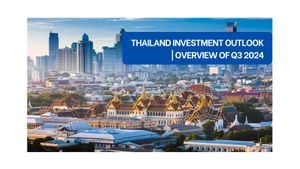Global logistics leader A.P. Moller – Maersk is ramping up its operations and sustainability initiatives to strengthen its position within the logistics sector. From strategic collaborations to expand capabilities and sustainability measures, Maersk is positioning itself as a key player in the shifting global trade dynamics.
With trade volumes reaching record levels, countries like Cambodia are observing significant growth in logistics activities. According to Rutger Heijsteeg, Managing Director of Maersk Cambodia, at the Transportation and Logistics Forum 2025, total trade has soared to an impressive $54.7 billion, making logistics services more imperative than ever for economic development.
Sihanoukville Autonomous Port, Cambodia’s primary maritime hub, recently reported handling over 1.05 million Twenty-foot Equivalent Units (TEUs), reflecting the burgeoning trade movement across the region. Meanwhile, Phnom Penh International Airport is facilitating over 75,000 tons of cargo, solidifying Cambodia’s place within the Asian supply chains.
Despite these advancements, Cambodia’s logistics infrastructure is not without challenges. High transport costs, customs inefficiencies, and limited options for multimodal transport are significant hurdles. Heijsteeg noted, “Trade is the main driver of Cambodia’s economic growth, but we mustensure our logistics infrastructure can keep up with demand. This requires coordinated investment and regulatory improvements.”
Addressing these challenges, Maersk has expanded its portfolio to include comprehensive port, warehousing, and trucking services. Currently, the company handles over 220,000 TEUs annually, processes about 88,000 customs declarations, and facilitates both first-mile and cross-border truck shipments, alongside substantial air freight operations. Heijsteeg reiterated, “Our mission is to offer seamless, end-to-end logistics solutionsthat empower Cambodia’s businesses to compete in the global market.”
Looking to the future, Maersk has laid out plans to implement several initiatives aimed at enhancing logistics operations. 2025 will see increased efforts such as enhancing cross-border trucking to improve trade routes with Thailand and Vietnam, developing cold chain logistics for the agricultural sector, and leveraging digital solutions for improved tracking and efficiency. Yet, Heijsteeg cautions, “If Cambodia wants to solidify its position as a logistics leaderin the Mekong region, infrastructure development must be a priority.”
Meanwhile, on the international front, Maersk has forged a partnership with Cochin Shipyard Limited (CSL) to bolster ship repair and building capabilities. Announced on February 24, 2025, this alliance aligns with India’s Vision 2047 maritime goals, positioning the nation among the top five global maritime hubs. The collaboration will include sharing technical expertise and training programs to uplift ship maintenance standards, which is timely considering global supply chain constraints faced by the shipping industry.
Maersk’s commitment to strengthening India’s maritime infrastructure was clearly expressed by one of its executives, stating, “Our collaboration with CSLrepresents our commitment to strengthening India’s maritime infrastructure.” This partnership is seen as significant, not only for CSL but for positioning India favorably within the maritime repair and service market.
Further signaling the impact of shifting global policies, recent U.S. tariff updates effective from March 12, 2025, are poised to disrupt supply chain dynamics for steel and aluminum imports. On imports from specific countries, tariffs will be set at 25%, effectively eliminating previous exemptions. Such sweeping changes are likely to challenge Maersk’s operations as it navigates the new logistics environment.
On the sustainability front, Maersk has initiated collaborations with retailers like Epson. The partnership will utilize greener shipping fuels aimed at reducing carbon emissions significantly. “By partnering with Maersk to use emission reduced fuel for our inbound ocean transportation, we are taking significant step toward achieving our sustainability goals,” explained Mark Robertson, Chief Supply Chain Officer Epson Europe.
Such initiatives showcase Maersk's intent to set new standards within the logistics industry, as Kaisa Helena Tikk, Head of Commercial Sustainability at Maersk stated, “Partnerships areessential for impactful solutions for decarbonisation, and our customers are at the core of these partnerships.”
The integration of these efforts not only strengthens Maersk's global logistics footing but also highlights the industry's pressing need for sustainability as trade volumes rise. Embracing technological advancements, strategic partnerships, and proactive measures will shape Maersk's future within the logistics space.



